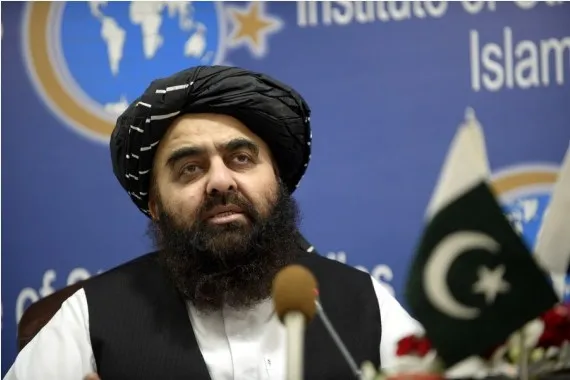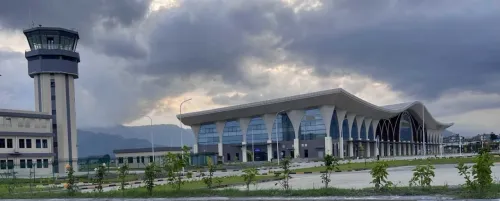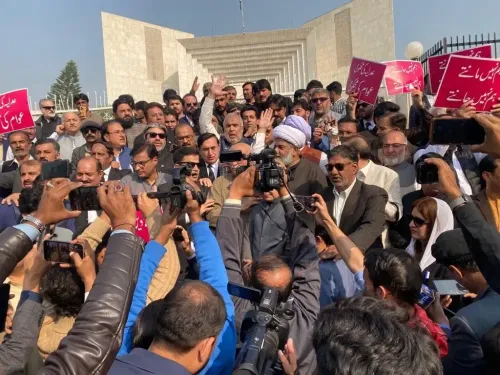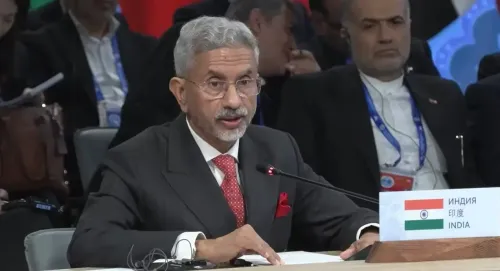Is Taliban FM Indirectly Criticizing Pakistan for Its Inhumane Treatment of Afghan Refugees?

Synopsis
Key Takeaways
- Taliban Foreign Minister criticizes treatment of Afghan refugees.
- Pakistan has seen a surge in detentions of Afghan migrants.
- Calls for international intervention are growing.
- Humanitarian organizations warn against forced deportations.
- Winter conditions pose severe risks to Afghan refugees.
Kabul, Nov 18 (NationPress) Taliban Foreign Minister Maulvi Amir Khan Muttaqi on Tuesday refrained from directly naming Pakistan while condemning "certain nations" for their "inhumane" treatment of Afghan refugees, driven by political motives.
While speaking at the Fifth Coordination Meeting between Afghanistan and United Nations (UN) agencies in Kabul, the Acting Foreign Minister of Afghanistan strongly criticized the neighboring country for breaching international norms and forcibly expelling Afghan refugees from their residences.
Muttaqi urged the international community to take immediate action, indirectly targeting Pakistan for its recent trend of deporting Afghan refugees as bilateral relations continue to deteriorate.
"The cruel treatment of Afghan refugees in some nations persists due to political agendas. During this severe winter, they are being evicted from their residences and subsequently denied access at border crossings. Is this not a blatant infringement of international refugee rights? Is this not a profound injustice against women, children, and the elderly?" questioned the Taliban minister.
As per UN reports, Iran and Pakistan are the two primary host nations for Afghan refugees. Iran has recently accommodated around 3.5 million Afghan refugees, while Pakistan has hosted approximately 1.6 million.
By September 2025, an estimated 126,800 Afghan refugees and individuals in a refugee-like status have returned to Afghanistan from Pakistan within the last year.
Recently, the United Nations High Commissioner for Refugees (UNHCR) noted that Pakistan has apprehended a record number of Afghan migrants in 2025, with the highest detentions occurring in the Balochistan and Punjab provinces.
The newly released UNHCR report indicated that most of the arrests took place in the districts of Chagai and Quetta in Balochistan, as well as Attock in Punjab, as reported by Afghanistan's prominent news agency Khaama Press.
According to the agency, Pakistani authorities detained 100,971 Afghans from January 1 to mid-November 2025, marking a significant increase compared to approximately 9,000 arrests in 2024 and over 26,000 in 2023. UNHCR reported that 76 percent of those detained were holders of Afghan Citizen Cards or undocumented migrants, while 24 percent had Proof of Registration cards.
The surge in detentions of Afghan migrants in Pakistan follows two government orders in 2025, which mandated the removal of Afghan migrants from Islamabad and Rawalpindi and permitted police to arrest PoR-card holders.
Numerous humanitarian organizations have called on Pakistan to ensure that any returns are voluntary and adhere to international obligations. They have cautioned that mass expulsions create instability along the Afghanistan border, where newly returned families frequently lack adequate housing, employment, and essential services.
Last month, Afghan refugees expressed their worries over increasing difficulties and heightened fears amid the ongoing crackdown in Pakistan. They claimed that Pakistani police had made announcements in certain mosques warning that anyone aiding refugees, including renting homes or shops, would be deemed a criminal by the government.
"A significant number of Afghan refugees, including children, women, and the elderly, have been detained in Pakistani centers for over 15 days, enduring extremely harsh conditions," quoted Atiqullah Mansoor, an Afghan refugee in Pakistan, as reported by Afghanistan's leading media outlet TOLO News.
Several refugees indicated that the Pakistani government has intensified arrests and forced deportations while also demolishing shelters. They urged the Pakistani authorities to halt the demolitions and allow them to stay in Pakistan, at least through the winter.
"Winter has already begun. Many of the remaining homes of Afghan refugees here have been destroyed. We appeal to the Pakistani government to cease demolishing the remaining homes; otherwise, refugees will find themselves without shelter and nowhere to go. Furthermore, the government has warned locals against renting homes to Afghan refugees, threatening them with legal repercussions," stated another Afghan refugee in Pakistan.









